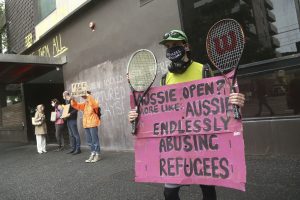The recent frenzy over tennis player Novak Djokovic being denied entry into Australia – ostensibly over failure to be vaccinated – has helped highlight the cruel detention conditions of refugees who are housed at the same run-down and bug infested hotel where Djokovic found himself after his visa was cancelled.
News reports that show Djokovic fans standing outside the Park Hotel in the inner Melbourne suburb of Carlton have also captured the presence of refugee advocates, some who have maintained a daily vigil outside the accommodation for years. These two unlikely groups have coalesced into demanding one thing: freedom.
The refugee advocates are condemning the inhumane detention policy that has led to people being held in detention for close to nine years after initially seeking asylum in Australia by boat. These detained asylum-seekers have been held in Australia’s offshore detention program, which has frequently been described as “cruel and inhumane.” Their detention has also cost Australian taxpayers over A$13 billion.
Guardian Australian reported that of the 3,127 who sought asylum in Australia between 2013 and December 2014, all were sent offshore and more than half remained in detention as of December 2020. Many are stuck in hotels around the country like the Park in Melbourne, where detainees are unable to leave or see people other than through their window.
Mehdi Ali, who came to Australia along with his cousin as children, both are members of the heavily persecuted Ahwazi Arab community in Iran. He has been held in detention for nine years – including his current detention at the Park Hotel. On Twitter, Mehdi derided the public for only having an interest in him now that he was in proximity to the world’s best tennis player: “It’s so sad that so many journalists contacted me yesterday to ask me about Djokovic. I’ve been in a cage for 9 years, I turn 24 today, and all you want to talk to me about is that.”
Refugees are now in housed Australian hotels, ironically due in part to the inhumane treatment they received in offshore detention facilities, both in Nauru and Papua New Guinea. Legislation was passed requiring medical treatment in Australia after reports of the privately-run facilities causing widespread malnutrition, illness, and death. Over 1,000 asylum seekers have been brought into Australia under this new legislation – despite the bellicosity of the Australian government, which fought against it and recently had it overturned.
Since winning the 2013 election on a policy of “stopping the boats,” the ruling Liberal-National coalition has repudiated any suggestion of allowing asylum seekers who arrived by boat to ever be permanently resettled on the mainland. They argue that these unequivocal measures save lives by deterring attempts to smuggle people into Australia.
Ostensibly this is true: Deaths at sea from boats attempting to come into Australia decreased after the harsh policies were enacted. Seeking asylum, however, is not illegal; mistreating asylum seekers is. The U.N. human rights review even criticized Australia for failing to end their offshore detention policy
Doctors who reported abuses in these offshore detention facilities were heavily scrutinized. In 2018, Dr. Nicole Montana was even arrested for taking a photo of a malnourished child, something forbidden by the Australian government in case the photos make it to the media or refugee advocates.
According to data from the Kaldor Centre in Sydney, 968 refugees had been permanently settled in the United States up until June 2021. Many others remain in limbo in a hotel that has had a large scale COVID-19 outbreak and is often derided for being filled with fleas and maggots.
Mehdi Ali and his cousin were both approved for resettlement in the United States under the terms of a deal reached with the Obama administration in 2016. Despite being rejected by the Trump administration, The Intercept reported they had been approved for asylum by Joe Biden, but nothing has been finalized.
Currently, many in the hotel are subject to inadequate health services. The International Health and Medical Services (IHMS) are responsible for providing medical services to the detainees. The Asylum Seeker Resource Centre notes that they are understaffed, lack expertise, and are currently facing criminal charges for a “failure to comply with health and safety standards in detention in a separate incident.”
The situation around Novak Djokovic has gained the world’s attention. For many refugee advocates, this attention is something they have been crying out for. It is important for the world to see the policies of the Australian government.
Behrouz Boochani, who highlighted the conditions of offshore detention facilities before he obtained asylum in New Zealand in 2019, summed up the feelings of many when he tweeted: “Some say that Australia’s reputation has been damaged because of the situation with [Djokovic,] but in a better world, public anxieties about international image would be stirred by the imprisonment of refugees in the same hotel for almost a decade.”
As the Associated Press reported, Djokovic himself returned to the tennis court Monday for training, having won a legal battle to stay in Australia and play in the Australian Open. Federal Circuit Court Judge Anthony Kelly reinstated Djokovic’s visa, ruling that the tennis player had not been given enough time to speak to his lawyers before the decision was made. Kelly also ordered the government to release Djokovic from the Park Hotel where he has spent the last four nights. But the world should spare a thought for the other detainees still trapped inside.
Djokovic is a household name and his detention has garnered a global spotlight. Hopefully that attention will extend to include the plight of the voiceless who will remain detained well after “the Djoker” leaves Melbourne.
The Associated Press contributed reporting.

































